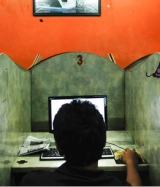 Technology
Technology
One Laptop per Child updates design for older pupils
(BBC): The so-called $100 laptop has undergone a facelift in order to be used by secondary school children. The machines, designed by One Laptop per Child (OLPC), are based on the original XO laptop, which was built for primary school children. The new computers feature a larger keyboard and upgraded software. Uruguay, which has already distributed nearly 400,000 XO laptops to primary schools, has ordered 90,000 of the new laptops, known as the XO-HS. It has also ordered 10,000 machines designed by rival Intel, which makes the Classmate PC, also developed for children.

‘Shady’ porn site practices put visitors at risk
 (BBC): Visitors to porn sites are at serious risk of being exploited by cyber criminals, a study has suggested. It found that many sites harboured malware or used "shady" practices to squeeze money out of their visitors. By creating their own porn sites researchers found that many consumers were vulnerable to known bugs and loopholes. Competition among porn sites makes the online adult industry ripe for abuse by hi-tech criminals. "They have almost inadvertently created a whole ecosystem that’s easy to abuse for cyber crime on a large scale," said Dr Gilbert Wondracek, a computer security expert.
(BBC): Visitors to porn sites are at serious risk of being exploited by cyber criminals, a study has suggested. It found that many sites harboured malware or used "shady" practices to squeeze money out of their visitors. By creating their own porn sites researchers found that many consumers were vulnerable to known bugs and loopholes. Competition among porn sites makes the online adult industry ripe for abuse by hi-tech criminals. "They have almost inadvertently created a whole ecosystem that’s easy to abuse for cyber crime on a large scale," said Dr Gilbert Wondracek, a computer security expert.

Are you ready for the big internet crunch?
 (CNN): The internet as we know it is reaching its limits. Within 18 months it is estimated that the number of new devices able to connect to the world wide web will plummet as we run out of "IP addresses" — the unique codes that provide access to the internet for everything from PCs to smart phones. "The internet as we know it will no longer be able to grow," Daniel Karrenberg, chief scientist at RIPE NCC, the organization that issues IP addresses in Europe, told CNN. "That doesn’t mean it will cease to function, but entry could be limited to new devices." Some estimate that by September 2011 the last large batches of addresses will be issued, meaning that months after that date there will be no new addresses available.
(CNN): The internet as we know it is reaching its limits. Within 18 months it is estimated that the number of new devices able to connect to the world wide web will plummet as we run out of "IP addresses" — the unique codes that provide access to the internet for everything from PCs to smart phones. "The internet as we know it will no longer be able to grow," Daniel Karrenberg, chief scientist at RIPE NCC, the organization that issues IP addresses in Europe, told CNN. "That doesn’t mean it will cease to function, but entry could be limited to new devices." Some estimate that by September 2011 the last large batches of addresses will be issued, meaning that months after that date there will be no new addresses available.
Ofcom unveils anti-piracy policy
(BBC): Lists of Britons who infringe copyright are to be drawn up by the UK’sbiggest ISPs, under proposals from the regulator Ofcom. The plan is contained in a draft code of practice it hopes will curb copyright infringement. Names and the number of times individuals infringe will be logged. Music firms and movie studios can request details from the list so that they can decide whether to start their own action against serial infringers. However, any suspected infringers will be sent three warning letters before any action can be taken. The letters will contain "easy to understand information on the nature of the allegations made against the subscriber and on what actions a subscriber can take."

Internet search engine gets pride and profits back
 (Reuters): Yahoo Inc said it could return to double-digit revenue growth in the next few years, as the Internet pioneer revamps its network of websites to attract users and advertisers in a shifting Internet industry. Yahoo told analystsWednesday that its net revenue growth between 2011 and 2013 would average between 7 and 10 percent as opposed to the roughly 13 percent revenue decline that it experienced in 2009. "Yahoo has its focus. It is excited about its future and it has its pride back," Chief Executive Carol Bartz said. Yahoo claims more than 600 million global users and plans to add more social media, video and local content to its properties as a way of growing its revenues.
(Reuters): Yahoo Inc said it could return to double-digit revenue growth in the next few years, as the Internet pioneer revamps its network of websites to attract users and advertisers in a shifting Internet industry. Yahoo told analystsWednesday that its net revenue growth between 2011 and 2013 would average between 7 and 10 percent as opposed to the roughly 13 percent revenue decline that it experienced in 2009. "Yahoo has its focus. It is excited about its future and it has its pride back," Chief Executive Carol Bartz said. Yahoo claims more than 600 million global users and plans to add more social media, video and local content to its properties as a way of growing its revenues.

Tell-all generation learns to keep things offline
 (New York Times): Min Liu, a 21-year-old liberal arts student at the New School in New York City, got a Facebook account at 17 and chronicled her college life in detail, from rooftop drinks with friends to dancing at a downtown club. Recently, though, she has had second thoughts. Concerned about her career prospects, she asked a friend to take down a photograph of her drinking and wearing a tight dress. When the woman overseeing her internship asked to join her Facebook circle, Ms. Liu agreed, but limited access to her Facebook page.
(New York Times): Min Liu, a 21-year-old liberal arts student at the New School in New York City, got a Facebook account at 17 and chronicled her college life in detail, from rooftop drinks with friends to dancing at a downtown club. Recently, though, she has had second thoughts. Concerned about her career prospects, she asked a friend to take down a photograph of her drinking and wearing a tight dress. When the woman overseeing her internship asked to join her Facebook circle, Ms. Liu agreed, but limited access to her Facebook page.

Debate on Internet’s limits grows in Indonesia
 (New York Times): Displeased that a statue of a 10-year-old Barack Obama was installed in a park here, Indonesians took their protest not to this capital’s most famous traffic circle but to Facebook. More than 56,000 online protesters later, city officials gave in to arguments that the park should be reserved to honor an Indonesian. This example of high-tech grass-roots organizing was the direct result of the explosion of social networking in Indonesia. But the boom is prompting a fierce debate over the limits of free expression in a newly democratic Indonesia, with the government trying to regulate content on the Internet and a recently emboldened news media pushing back.
(New York Times): Displeased that a statue of a 10-year-old Barack Obama was installed in a park here, Indonesians took their protest not to this capital’s most famous traffic circle but to Facebook. More than 56,000 online protesters later, city officials gave in to arguments that the park should be reserved to honor an Indonesian. This example of high-tech grass-roots organizing was the direct result of the explosion of social networking in Indonesia. But the boom is prompting a fierce debate over the limits of free expression in a newly democratic Indonesia, with the government trying to regulate content on the Internet and a recently emboldened news media pushing back.

Eight-year olds with Facebook pages
 (The Telegraph): Children as young as eight have Facebook pages and use other social media websites, ignoring the age restrictions, according to an official report. Ofcom, the media watchdog, said that one in five children, 19 per cent, between eight and 12 years old use social media sites such as Facebook, Bebo or MySpace. This is despite these sites officially having an age limit of 13. One in six parents didn’t know their children are on social networks. The report included internet audience data that showed that 37 per cent of home internet users aged between five and seven visited Facebook in October 2009. But it did not examine how many had profiles on the site.
(The Telegraph): Children as young as eight have Facebook pages and use other social media websites, ignoring the age restrictions, according to an official report. Ofcom, the media watchdog, said that one in five children, 19 per cent, between eight and 12 years old use social media sites such as Facebook, Bebo or MySpace. This is despite these sites officially having an age limit of 13. One in six parents didn’t know their children are on social networks. The report included internet audience data that showed that 37 per cent of home internet users aged between five and seven visited Facebook in October 2009. But it did not examine how many had profiles on the site.

Firefox releases security patch
 (BBC): Mozilla has released Firefox 3.6.2 almost a week early after security issues were found in earlier versions. Firefox 3.6.2 was originally due to launch at the end of March, but is available to download now from the Mozilla website. The security hole led the German government had issued a warning about Firefox 3.6. The Federal Office for Information Security made a similar ruling on the safety of Internet Explorer in January. The office warned that the Firefox vulnerability, confirmed by Firefox makers, could allow hackers to run malicious programs on users’ computers. The BurgerCERT team of the Federal Office for Information Security (BSI) had recommended that users stop using Firefox until the tested fix was released – in a move remarkably similar to the January announcement, in which France followed suit just days later.
(BBC): Mozilla has released Firefox 3.6.2 almost a week early after security issues were found in earlier versions. Firefox 3.6.2 was originally due to launch at the end of March, but is available to download now from the Mozilla website. The security hole led the German government had issued a warning about Firefox 3.6. The Federal Office for Information Security made a similar ruling on the safety of Internet Explorer in January. The office warned that the Firefox vulnerability, confirmed by Firefox makers, could allow hackers to run malicious programs on users’ computers. The BurgerCERT team of the Federal Office for Information Security (BSI) had recommended that users stop using Firefox until the tested fix was released – in a move remarkably similar to the January announcement, in which France followed suit just days later.

Digital Economy Bill bill could ‘breach rights’
 (BBC): An influential group of MPs and peers has said the government’s approach to illegal file-sharing could breach the rights of internet users. The Joint Select Committee on Human Rights said the government’s Digital Economy Bill needed clarification. It said that technical measures – which include cutting off persistent pirates – were not "sufficiently specified". "The internet is constantly creating new challenges for policy-makers but that cannot justify ill-defined or sweeping legislative responses, especially when there is the possibility of restricting freedom of expression or the privacy of individual users," said Andrew Dismore MP and chair of the Committee.
(BBC): An influential group of MPs and peers has said the government’s approach to illegal file-sharing could breach the rights of internet users. The Joint Select Committee on Human Rights said the government’s Digital Economy Bill needed clarification. It said that technical measures – which include cutting off persistent pirates – were not "sufficiently specified". "The internet is constantly creating new challenges for policy-makers but that cannot justify ill-defined or sweeping legislative responses, especially when there is the possibility of restricting freedom of expression or the privacy of individual users," said Andrew Dismore MP and chair of the Committee.